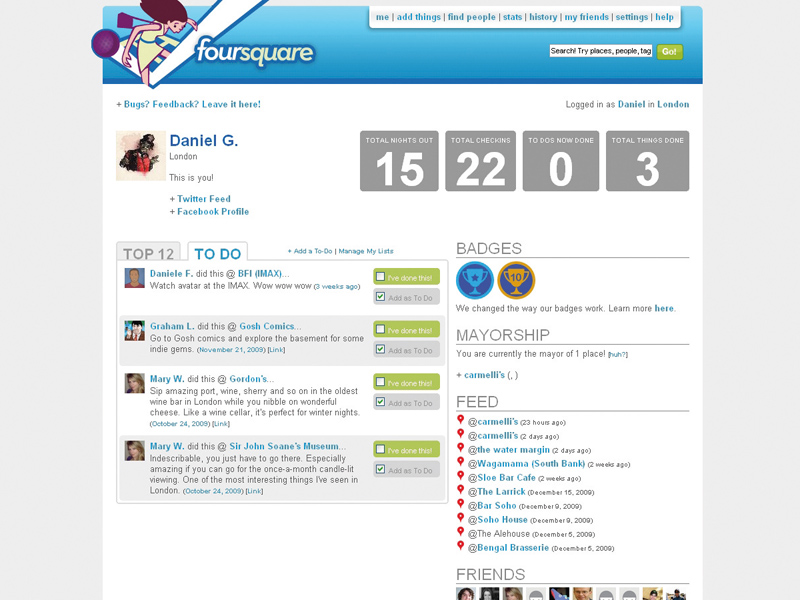TechRadar Verdict
An interesting idea but we can't really see what purpose this will serve above and beyond a normal social network
Pros
- +
Interesting idea
- +
Good integration with iPhone
- +
Achievement system
Cons
- -
Open to abuse
- -
No real purpose
Why you can trust TechRadar
With the internet fragmenting and every community becoming alienated from its peers, specialist social networks have been springing up to act as a kind of glue and arbitrarily stick all our disparate groups of friends together.
Flickr has photos covered, Last.fm deals with music, SocialPicks gives stock tips, LinkedIn serves people who like wearing ties and Facebook reconnects you with people you don't really want to know... and then they all plug into each other.
The ostensible focus of free social network Foursquare is finding 'stuff to do'. So if you're at a loose end in, say, Greenwich village, you boot up the app on your mobile phone (it supports BlackBerry, Android, iPhone and Palm Pre) and it will find activities in that area based on what other people have done there.
More advanced versions of the app – in particular the iPhone edition – integrate with other elements of your phone, pinpointing your location using GPS or the phone network or importing contacts from your address book. If your phone doesn't support these features, you can update the application via SMS.
Pints win prizes
Like all social networks, Foursquare is about interacting with friends. It lets you do this in three ways. Firstly, you can invite people or add existing users to your network, as well as finding friends in your local area – something that's very useful in densely populated areas such as Manhattan or London.
Secondly, you can add recommendations and let your friends know where you are. Thirdly, you can see what activities other users have recommended (or avoided) in the area you're investigating.
Sign up for breaking news, reviews, opinion, top tech deals, and more.
There's a system of rewards that serves as an incentive for adding activities and venues. This is implemented in quite a slapdash fashion, a bit like the achievements in Steam or Xbox Live. Some of the badges reward regularity, such as checking into several venues in one night or the same venue for multiple nights (which might also make you that venue's 'mayor').
Others are awarded for a particular type of behaviour, like attending CES or checking in with friends. Some of the prizes are just plain bizarre, like the one awarded for checking into places tagged with 'douchebag'. As anyone who's used Xbox Live will know, achievements such as these provide their own motivation to some people.
Parallel to the achievements is a points system that rewards participation, especially initial or original activity. However, there's no real-life purpose to doing this.
Foursquare used to make donations to charity as well as issuing points, but it no longer does so.
Cheating the system
These reward functions and the slightly confusing nature of the network are derived from Foursquare's previous incarnation. The developers, Crowley and Rainart, previously worked on Dodgeball, the venue- and friend-locating social network that Google bought and turned into the so-so Google Latitude.
There's obviously a coherent technology behind all of these apps – the ability to track nearby friends – but the additional elements are all a bit primitive.
Uptake has been much higher in the US, however, where some restaurants are providing discounts to their most regular customer – the Foursquare 'mayor'. It's also easy to cheat the system, claiming you're at a venue when you're not, and there's always the danger of vendor capture, where a venue creates multiple fake accounts to manipulate review scores (something we've already experienced with the otherwise excellent TripAdvisor).
The technology is solid, and its Twitter and Facebook integration make it useful for people (your correspondent included) who for some reason believe that the rest of the world is vaguely interested in their current whereabouts and activities, or might want to join in.
However, Foursquare is currently a social network in search of a purpose. A larger userbase in the UK would certainly help it here, but it would also put it in danger from those seeking to corrupt the system – which it currently has no effective way of combating.
Follow TechRadar Reviews on Twitter: http://twitter.com/techradarreview
